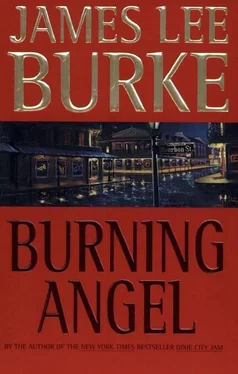James Burke - Burning Angel
Здесь есть возможность читать онлайн «James Burke - Burning Angel» весь текст электронной книги совершенно бесплатно (целиком полную версию без сокращений). В некоторых случаях можно слушать аудио, скачать через торрент в формате fb2 и присутствует краткое содержание. Город: New York, Год выпуска: 1995, ISBN: 1995, Издательство: Hyperion, Жанр: Детектив, на английском языке. Описание произведения, (предисловие) а так же отзывы посетителей доступны на портале библиотеки ЛибКат.
- Название:Burning Angel
- Автор:
- Издательство:Hyperion
- Жанр:
- Год:1995
- Город:New York
- ISBN:978-0-7868-6082-1
- Рейтинг книги:5 / 5. Голосов: 1
-
Избранное:Добавить в избранное
- Отзывы:
-
Ваша оценка:
- 100
- 1
- 2
- 3
- 4
- 5
Burning Angel: краткое содержание, описание и аннотация
Предлагаем к чтению аннотацию, описание, краткое содержание или предисловие (зависит от того, что написал сам автор книги «Burning Angel»). Если вы не нашли необходимую информацию о книге — напишите в комментариях, мы постараемся отыскать её.
Burning Angel — читать онлайн бесплатно полную книгу (весь текст) целиком
Ниже представлен текст книги, разбитый по страницам. Система сохранения места последней прочитанной страницы, позволяет с удобством читать онлайн бесплатно книгу «Burning Angel», без необходимости каждый раз заново искать на чём Вы остановились. Поставьте закладку, и сможете в любой момент перейти на страницу, на которой закончили чтение.
Интервал:
Закладка:
“Give me a few minutes,” I called.
“One of us got to go in town.”
“I know that, podna.”
“Long as you know,” he said, and walked back down the slope.
I could hear the wood in the floor creak under my feet, the wind scudding leaves across the gallery.
“Back away from the door,” the woman said.
“We’ve still got the original manuscript,” I said.
“Nobody else cares about it. Back away from the door and sit in the stuffed chair.”
“Fuck you, Terry, or whatever your name is.”
Her face was as opaque as plaster. She closed the ends of the pillow around the Ruger, brought the barrel’s tip upward until it was aimed at my throat.
I felt my eyes water and go out of focus.
Outside, Tripod raced on his chain up and down the clothesline. Her face jerked at the sound, then she shifted her weight, glanced quickly at the side window, an incisor tooth biting down on her lip, inadvertently moved the barrel’s aim two inches to the side of my throat.
Bootsie fired from the hallway, the Beretta pointed in front of her with both hands.
The first round hit the woman high up in the right arm. Her blouse jumped and colored as though a small rose had been painted in the cloth by an invisible brush. But she swallowed the sound that tried to rise from her throat, and turned toward the hallway with the Ruger still in her hand.
Bootsie fired again, and the second round snapped a brittle hole through the left lens of the black-tinted sunglasses worn by the woman named Terry. Her fingers splayed stiffly at odd angles from one another as though all of her nerve connections had been severed; then her face seemed to melt like wax held to a flame as she slipped down between the wall and the stuffed chair, a vertical red line streaking the wallpaper.
My hands were shaking when I set the safety on the Beretta and removed it from Bootsie’s grasp, pulled the magazine and ejected the round from the chamber.
I squeezed her against me, rubbed my hands over her hair and back, kissed her eyes and the sweat on her neck.”
She started toward the woman on the floor.
“No,” I said, and turned her toward the kitchen, the light pouring through the western windows, the trees outside swelling with wind.
“We have to go back,” she said.
“No.”
“Maybe she’s still... Maybe she needs...”
“No.”
I made her sit down on the redwood picnic bench while I walked to the garden by the coulee and found the portable phone where she had dropped it in the grass, the transmission button still on. But before I could punch in 911 I heard sirens in the distance and saw Batist come out the back door with a dogleg twenty-gauge in his hand.
“It’s okay,” I said. “Send the deputies inside.”
His eyes went from me to Bootsie.
“We’re fine here, Batist,” I said.
He nodded, cracked open the barrel of the shotgun, and walked down the drive, the open breech crooked over his forearm, peeling the cellophane off a cigar with his thumbnail.
I put my palm on Bootsie’s neck, felt the wetness of her hair, her skin that was as hot as a lamp shade.
“It’s going to pass,” I said.
“What?” She looked at me blankly.
“You didn’t have a choice. If you hadn’t picked up Clete’s call, I’d be dead.”
“Clete? Clete didn’t... The phone rang out in the garden and he said, “Dave’s in trouble. I can’t help him. It’s too far to come now. You have to do it.”
“Who?”
“I can’t handle this. You said you saw his tattoo on the remains in the morgue. You swore you did. But I know that voice, Dave. My God...” But she didn’t finish. She pressed the heels of her hands into her eyes and began to weep.
Chapter 37
I believe Moleen Bertram was like many of my generation with whom I grew up along Bayou Teche. We found ourselves caught inside a historical envelope that we never understood, borne along on wind currents that marked our ending, not our beginning, first as provincial remnants of a dying Acadian culture, later as part of that excoriated neo-colonial army who would go off to a war whose origins were as arcane to us as the economics of French poppy growers.
When we finally made a plan for ourselves, it was to tear a hole in the middle of our lives.
I don’t know why Moleen chose to do it in an apartment off Rampart, near the edge of the Quarter, not far from the one-time quadroon brothels of Storyville and the Iberville Project where Sonny Boy grew up. Perhaps it was because the ambiance of palm fronds, rusting grillwork, and garish pastels that tried to cover the cracked plaster and crumbling brick was ultimately the signature of Moleen’s world — jaded, alluring in its decay, seemingly reborn daily amidst tropical flowers and Gulf rainstorms, inextricably linked to a corrupt past that we secretly admired.
At five in the morning I got the call from an alcoholic ex-Homicide partner at First District Headquarters.
“The coroner won’t be able to bag it up till after eight, in case you want to come down and check it out,” he said,
“How’d you know to call me?” I said.
“Your business card was on his nightstand. That and his driver’s license were about all he had on him. The place got creeped before we arrived.” He yawned into the phone. “What was he, a pimp?”
The flight in the department’s single-engine plane was only a half hour, but the day was already warm, the streets dense with humidity, when Helen Soileau and I walked through the brick-paved courtyard of the building, into the small apartment whose walls were painted an arterial red and hung with black velvet curtains that covered no windows.
Moleen and Ruthie Jean lay fully clothed on top of the double bed, their heads wrapped in clear plastic bags. A crime scene photographer was taking their picture from several angles; each time his flash went off their faces seemed to leap to life inside the folds of the plastic.
“He was a lawyer, huh? Who was the broad?” my ex-partner said. He wore a hat and was drinking coffee from a Styrofoam cup.
“Just a farm girl,” I said.
“Some farm girl. She did both of them.”
“She did what?” I said.
“His bag was tied from behind, hers in front. I hope she was a good piece of ass,” he said.
“Shut up,” Helen said. “Did you hear me? Just shut the fuck up.”
Later, Helen and I turned down an offer of a ride to the airport and instead walked up to Canal to catch a cab. The street was loud with traffic and car horns, the air stifling, the muted sun as unrelenting and eye-watering as a hangover. The crowds of people on the sidewalks moved through the heat, their faces expressionless, the gaze in their eyes introspective and dead, preset on destinations that held neither joy nor pain, neither loss nor victory.
“What are you doing, Streak?” Helen said.
I took her by the hand and crossed to the neutral ground, drew her with me into the belly of the great iron streetcar from the year 1910 that creaked on curved tracks past the Pearl, with its scrolled black colonnade on the corner of Canal and St. Charles, where Sonny Boy used to put together deals under a wood-bladed fan, on up the avenue, clattering past sidewalks cracked by oak roots as thick as swollen fire hoses, into a long tunnel of trees and heliographic light that was like tumbling through the bottom of a green well, to a place where, perhaps, the confines of reason and predictability had little application.
Epilogue
Late fall is a strange time of year in southern Louisiana. After first frost robins fill the trees along the bayou and camellias that seem fashioned from crepe paper bloom with the colors of spring, even though winter is at hand. The sky is absolutely blue and cloudless, without an imperfection in it, but at evening the sunlight hardens and grows cold, as it might in a metaphysical poem, the backroads are choked with cane wagons on their way to the mill, and the stubble fires on the fields drench the air with an acrid, sweet smell like syrup scorched on a woodstove.
Читать дальшеИнтервал:
Закладка:
Похожие книги на «Burning Angel»
Представляем Вашему вниманию похожие книги на «Burning Angel» списком для выбора. Мы отобрали схожую по названию и смыслу литературу в надежде предоставить читателям больше вариантов отыскать новые, интересные, ещё непрочитанные произведения.
Обсуждение, отзывы о книге «Burning Angel» и просто собственные мнения читателей. Оставьте ваши комментарии, напишите, что Вы думаете о произведении, его смысле или главных героях. Укажите что конкретно понравилось, а что нет, и почему Вы так считаете.











![Twelve Winged Dark Burning Angel - Супер Ген Бога. Том 2 [101-200 главы]](/books/412125/twelve-winged-dark-burning-angel-super-gen-boga-tom-2-101-200-glavy-thumb.webp)
![Twelve Winged Dark Burning Angel - Супер Ген Бога. Том 1 [1-100 главы]](/books/412126/twelve-winged-dark-burning-angel-super-gen-boga-tom-1-1-100-glavy-thumb.webp)